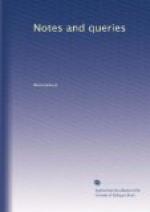“The French king lying in his camp, sent secretly into England a privy person, a very witty man, to entreat of a peace between him and the king our sovereign lord, whose name was John Joachin; he was kept as secret as might be, that no man had intelligence of his repair; for he was no Frenchman, but an Italian born, a man before of no estimation in France, or known to be in favour with his master, but to be a merchant; and for his subtle wit, elected to entreat of such affairs as the king had commanded him by embassy. This Joachin, after his arrival here in England, was secretly conveyed unto the king’s manor of Richmond, and there remained until Whitsuntide; at which time the cardinal resorted thither, and kept there the said feast very solemnly. In which season my lord caused this Joachin divers times to dine with him, whose talk and behaviour seemed to be witty, sober, and wondrous discreet.”
My note on this passage says:—
“The name of this person was Giovanni Joacchino Passano, a Genoese; he was afterwards called Seigneur de Vaux. The emperor, it appears, was informed of his being in England, and for what purpose. The cardinal stated that Joacchino came over as a merchant; and that as soon as he discovered himself to be sent by the lady regent of France, he made De Praet (the emperor’s ambassador) privy thereto, and likewise of the answer given to her proposals. The air of mystery which attached to this mission naturally created suspicion; and, after a few months, De Praet, in his letters to the emperor, and to Margaret, governess of the Netherlands, expressed his surmise that all was not right, alleging his reasons. His letters were intercepted by the cardinal, and read before the council. Charles and Margaret complained of the insult, and the cardinal explained as well as he could: at the same time protesting against the misinterpretation of De Praet, and assuring them that nothing could be further from his wish than that any disunion should arise between the king his master and the emperor; and notwithstanding the suspicious aspect of this transaction, his dispatches, both before and after this fracas, strongly corroborate his assertions. Wolsey suspected that the Pope was inclined toward the cause of Francis, and reminded him of his obligations to Henry and Charles. The Pope had already taken the alarm, and had made terms with the French king, but had industriously concealed it from Wolsey, and at length urged in his excuse that he had no alternative. Joacchino was again in England upon a different mission, and was an eye-witness of the melancholy condition of the cardinal when his fortunes were reversed. He sympathised with him, and interested himself for him with Francis and the queen dowager, as appears by his letters published in Legrand, Histoire du Divorce de Henry VIII.”
I think it is from this interesting book, which throws much light upon many of the intricate passages of the history of the times, that I derived my information. It is in all respects a work worth consulting.




